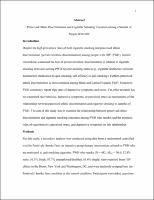Please use this identifier to cite or link to this item:
https://hdl.handle.net/20.500.12202/9888| Title: | Perceived ethnic discrimination and cigarette smoking cessation among a sample of people with HIV |
| Authors: | Weinberger, Andrea H. Seng, Elizabeth K. Shute, Jonathan Foley, Frederick W. Feldman, Jonathan M. Agterberg, Silvana Jones |
| Keywords: | Cigarette Smoking HIV/AIDS Clinical psychology Perceived Discrimination Race/Ethnicity Self-efficacy |
| Issue Date: | 29-Feb-2024 |
| Publisher: | Yeshiva University |
| Citation: | Agterberg, S. J. (2024, February 29). Perceived ethnic discrimination and cigarette smoking cessation among a sample of people with HIV (Publication No. 30636055) [Doctoral dissertation, Yeshiva University]. |
| Series/Report no.: | Ferkauf Graduate School of Psychology: Doctoral Dissertations;Publication No. 30636055 |
| Abstract: | INTRODUCTION. Despite the high prevalence rates of both cigarette smoking and perceived ethnic discrimination (perceived ethnic discrimination) among people with HIV (PWH), limited research has examined the role of perceived ethnic discrimination in relation to cigarette smoking behaviors among PWH beyond smoking status (e.g., cigarette abstinence, nicotine dependence, motivation to quit smoking, self-efficacy to quit smoking). Further, perceived ethnic discrimination is most common among Black and Latino/Hispanic PWH. Moreover, PWH commonly report high rates of depressive symptoms and stress. Yet, prior research has not examined race/ethnicity, depressive symptoms, or perceived stress as mechanisms of the relationship between perceived ethnic discrimination and cigarette smoking in samples of PWH. The aim of this study was to examine the relationship between perceived ethnic discrimination and cigarette smoking outcomes among PWH who smoke, and the potential roles of race/ethnicity, perceived stress, and depressive symptoms on this relationship. METHODS. For this study, a secondary analysis was conducted using data from a randomized controlled trial for Positively Smoke Free, an intensive group therapy intervention tailored to PWH who are motivated to quit smoking cigarettes. PWH who smoke (N = 442; Mage = 50.6; 52.8% male; 56.3% Black; 87.7% unemployed/disabled; 81.6% single) were recruited from HIV clinics in the Bronx, New York and Washington, DC, and were randomly assigned into the Positively Smoke Free condition or the control condition. Participants were asked questions regarding demographic information, smoking behaviors (e.g., nicotine dependence, motivation to quit smoking, self-efficacy to quit smoking/smoking temptations), perceived ethnic discrimination, depressive symptoms, and perceived stress. Participants were followed up with 3- and 6-months after study completion and smoking abstinence was assessed at these time points using self-report and biochemical confirmation. Separate analyses were conducted using the full sample and the Positively Smoke Free sample. RESULTS. Greater perceived ethnic discrimination was related to lower nicotine dependence and lower self-efficacy to quit smoking among PWH. There was an indirect effect of depressive symptoms such that greater perceived ethnic discrimination at baseline was associated with greater depressive symptoms at 3-month follow-up, and greater depressive symptoms were related to greater nicotine dependence and lower self-efficacy to quit smoking at 6-month follow-up. Moreover, race/ethnicity interacted with time and perceived ethnic discrimination to predict nicotine dependence. Hispanic/Latino participants with greater perceived ethnic discrimination reported higher nicotine dependence over time compared to Black and Black/Hispanic participants with greater perceived ethnic discrimination. Perceived ethnic discrimination was not related to smoking abstinence or motivation to quit smoking, and perceived stress did not mediate the relationship between perceived ethnic discrimination and any of the smoking outcomes. When analyses were conducted in the Positively Smoke Free sample, the majority of findings remained the same. In contrast to the finding from the full sample, the relationship between perceived ethnic discrimination and self-efficacy in the Positively Smoke Free sample was moderated by race/ethnicity and time such that Black PWH with high perceived discrimination reported increased self-efficacy to quit smoking over time while Hispanic/Latino PWH did not. Moreover, depressive symptoms mediated the relationship between perceived ethnic discrimination and smoking abstinence in the Positively Smoke Free sample such that high perceived ethnic discrimination was associated with greater depressive symptoms at baseline, which were in tern associated with reduced likelihood of abstinence at 3-month follow-up. CONCLUSIONS. This study advanced research related to smoking cessation among PWH by examining the relationship of perceived ethnic discrimination and numerous smoking outcomes, as well as potential mechanisms of these relationships. Findings highlight the importance of tailoring smoking cessation interventions to PWH with high levels of perceived ethnic discrimination, enhancing self-efficacy to quit smoking, and increasing use of adaptive strategies to cope with perceived ethnic discrimination, smoking temptations, and depressive symptoms. Moreover, providers must consider the ways in which race, ethnicity, and culture shape experiences and perceptions of ethnic discrimination and influence self-efficacy to quit smoking among PWH in order to develop culturally responsive and inclusive smoking cessation interventions. |
| Description: | Doctoral dissertation, PhD / Open Access |
| URI: | https://hdl.handle.net/20.500.12202/9888 |
| Appears in Collections: | Ferkauf Graduate School of Psychology: Doctoral Dissertations |
Files in This Item:
| File | Description | Size | Format | |
|---|---|---|---|---|
| Agterberg Jones- 2024 )A Dissertation-Final.pdf | 1.44 MB | Adobe PDF |  View/Open |
This item is licensed under a Creative Commons License

